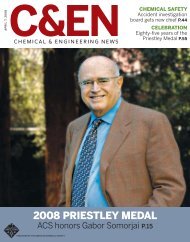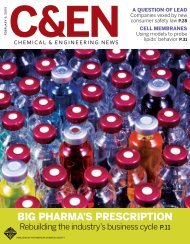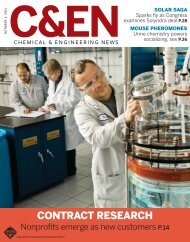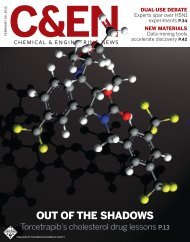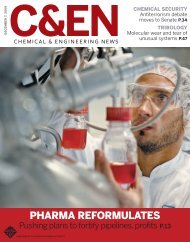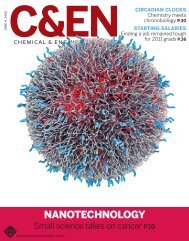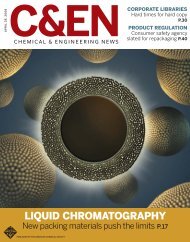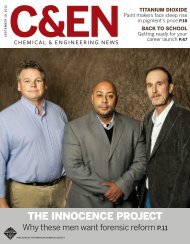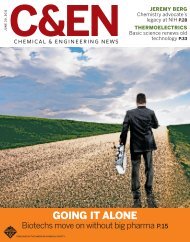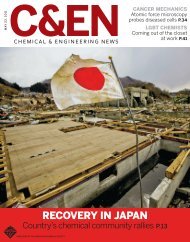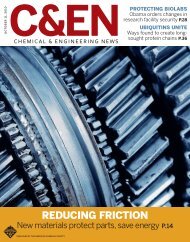Chemical & Engineering News Digital Edition ... - IMM@BUCT
Chemical & Engineering News Digital Edition ... - IMM@BUCT
Chemical & Engineering News Digital Edition ... - IMM@BUCT
Create successful ePaper yourself
Turn your PDF publications into a flip-book with our unique Google optimized e-Paper software.
DAVID PYLE<br />
Sea, the Black Sea, and the Arabian Sea. So<br />
far, he’s done 14 dives in Alvin.<br />
As exciting as their jobs sound, these<br />
chemists are not primarily after the thrill of<br />
adventure. Instead, they say, they’re driven<br />
by the science. “I’m not somebody who<br />
goes out to find tough places to get samples<br />
from just for the sake of it,” Mather says.<br />
“But if the science justifies it, then that’s<br />
very exciting.”<br />
Nevertheless, it’s safe to say that these<br />
chemists are all explorers at heart. Kounaves<br />
says that when he was a child, he<br />
wanted to be an astronaut because he was<br />
fascinated with space exploration. As an<br />
undergraduate at California State University,<br />
San Diego, Kounaves couldn’t decide<br />
between physics, biology, and engineering,<br />
so he ended up majoring in chemistry.<br />
In graduate school at the University<br />
of Geneva, in Switzerland, he focused on<br />
environmental chemistry and immersed<br />
himself in fieldwork. As he studied the environment<br />
on Earth, he began to wonder,<br />
“What about environments on other planets?”<br />
Little by little, he gravitated back to<br />
his childhood dream of space exploration.<br />
Today, Kounaves is the science lead for the<br />
Phoenix Mars mission’s<br />
wet chemistry<br />
lab.<br />
Unlike Kounaves,<br />
Luther<br />
considers himself a<br />
late bloomer in the<br />
world of extreme<br />
chemistry. He<br />
ON THE EDGE<br />
Wearing a gas<br />
mask, Mather sits<br />
on the crater rim of<br />
Villarrica Volcano, in<br />
Chile, after collecting<br />
gas and aerosol<br />
samples.<br />
earned a Ph.D. in physical inorganic chemistry<br />
from the University of Pittsburgh in<br />
1972 and taught chemistry and physics at<br />
Kean College of New Jersey for 14 years.<br />
While attending scientific meetings, Luther<br />
found himself engaging in conversation<br />
with many oceanographers who were<br />
doing extensive fieldwork. “The next thing<br />
I knew, I found that this was kind of interesting,”<br />
he says.<br />
In 1986, he joined the University of<br />
Delaware’s College of Marine Studies. The<br />
following year, Luther took his first major<br />
MUSTAFA YUCEL<br />
DEEP-SEA EXPLORER<br />
Luther (right) and<br />
Alvin pilot Mark O.<br />
Spear prepare for a<br />
deep-sea dive.<br />
expedition to the<br />
Mediterranean Sea<br />
to study hypersaline<br />
and anoxic<br />
brines at the bottom<br />
of the sea. The<br />
next year, he went<br />
on a research expedition to study chemical<br />
reactions in the Black Sea. After that, he<br />
was hooked. “It’s possible at almost any<br />
part of your career to get involved in this<br />
kind of work,” he says.<br />
At age 31, Mather is the youngest of the<br />
extreme chemists C&EN interviewed. She<br />
says that after receiving an M.S. degree in<br />
chemistry, she decided to pursue research<br />
with a more environmental angle. She also<br />
knew she didn’t want to be in the lab all<br />
the time. She found the perfect match with<br />
her Ph.D. work on volcanic atmospheric<br />
chemistry.<br />
Mather says that doing fieldwork allows<br />
her to stay in touch with the big picture of<br />
what she’s doing. “In my line of science,<br />
if you don’t go out some of the time, you<br />
sort of lose touch a little bit with how the<br />
samples are being collected, and it’s good<br />
to see something through from collection<br />
to analysis to writing the paper. That way,<br />
you get a very thorough understanding of<br />
the science.”<br />
DOING EXTREME chemistry doesn’t have<br />
to interfere with your work-life balance.<br />
The chemists point out that their time in<br />
the field encompasses only a small percentage<br />
of their jobs. Mather says she spends<br />
only about four weeks a year doing fieldwork.<br />
Luther spends one to two months a<br />
year doing fieldwork. And Kounaves is out<br />
in the field for about five weeks every two<br />
years. The rest of the time, the researchers<br />
are back at their universities analyzing data<br />
and writing their papers. Mather says that’s<br />
actually the part of her job she finds most<br />
exciting because “that’s when you start<br />
making sense of the results you pulled in.”<br />
As Kounavis, Luther, and Mather show,<br />
chemists can decide to go extreme at any<br />
point in their career. “The important thing<br />
is to realize that you have the ability to enable<br />
yourself to do these things,” Kounaves<br />
says. “Just because you’re a chemist doesn’t<br />
mean you’re limited to doing exactly what<br />
chemists are supposed to be doing.” What’s<br />
critical is finding a scientific topic that<br />
you’re passionate about, Luther says.<br />
Mather agrees. “You have to enjoy the<br />
science,” she says; otherwise, the fun stops<br />
at the end of the adventure. ■<br />
WWW.CEN-ONLINE.ORG 56 NOVEMBER 3, 2008



